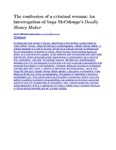| dc.description.abstract | Autobiographical writing in Kenya, specifically crime writing, is dominated by
male writers. Hence, Saga McOdongo's autobiography, Deadly Money Maker, is
unique because it is one of its kind, written by a Kenyan woman to foreground
the criminalisation of women in Africa. Other Kenyan texts tackling issues on
prison and imprisonment, appear to be relatively well-represented with both male
and female writers articulating their experiences in incarceration as a result of
first, colonialism, and later for political reasons. McOdongo's autobiography
deviates from the rest because it is the only one from a woman's perspective that
explores the subject of criminalisation. However, although studies on confession
normally deal with crime in relation to penitence and forgiveness, I argue that
Saga McOdongo's Deadly Money Maker adopts a disruptive confessional mode
because at the end of her autobiography, the aspect of redemption remains a
contestable one. This article examines the writer's confession: that is, how she
admits to getting involved in drug peddling, her experience of prison, assumed
contrition and the complexities of restoration. Also, I demonstrate that criminal
autobiographical writing is gendered and that a holistic study of prison literature
in Africa cannot overlook women's prison writing. | en_US |

